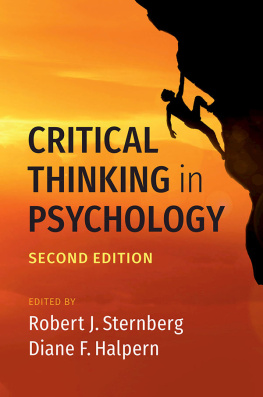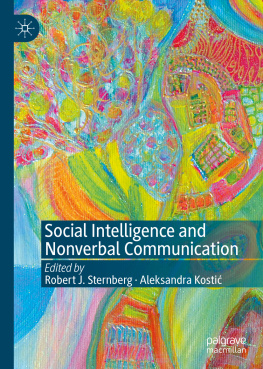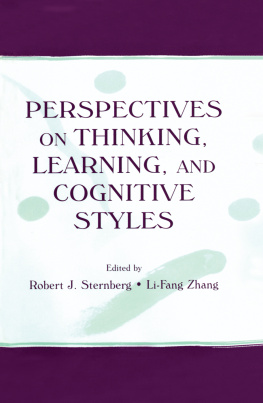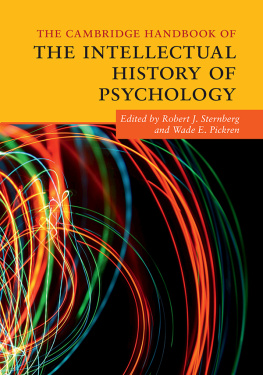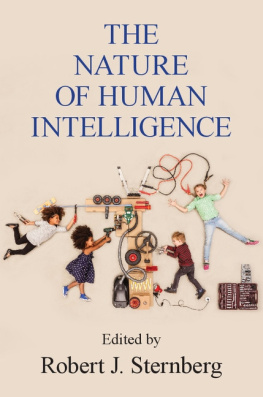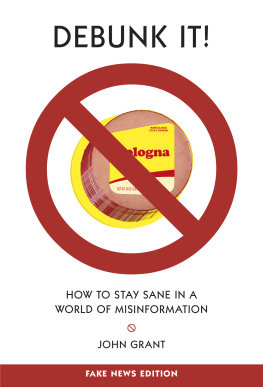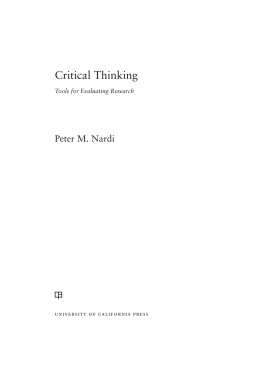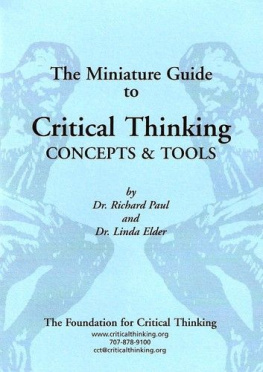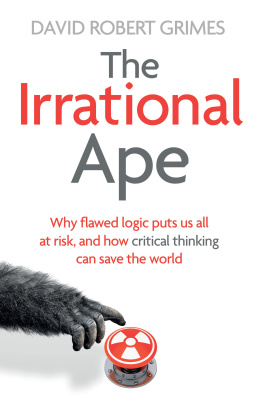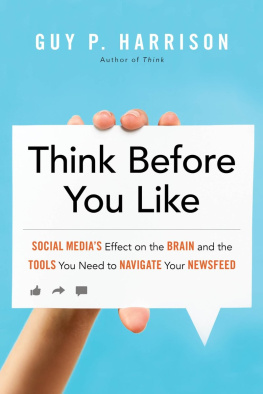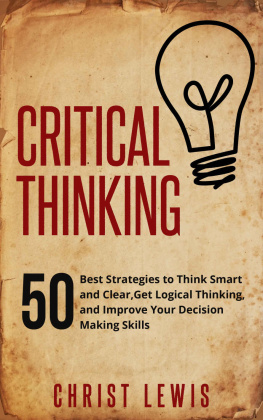Good scientific research depends on critical thinking at least as much as factual knowledge; psychology is no exception to this rule. And yet, despite the importance of critical thinking, psychology students are rarely taught how to think critically about the theories, methods, and concepts they must use. This book shows students and researchers how to think critically about key topics such as experimental research, statistical inference, case studies, logical fallacies, and ethical judgments. Using updated research findings and new insights, this volume provides a comprehensive overview of what critical thinking is and how to teach it in psychology. Written by leading experts in critical thinking in psychology, each chapter contains useful pedagogical features, such as critical thinking questions, brief summaries, and definitions of key terms. It also supplies descriptions of each chapter authors critical thinking experience, which evidences how critical thinking has made a difference to facilitating career development.
Robert J. Sternberg is Professor of Human Development at Cornell University, USA, and Honorary Professor of Psychology at Heidelberg University, Germany.
Diane F. Halpern is Professor Emerita of Psychology at Claremont McKenna College, USA.
Robert J. Sternberg
Diane F. Halpern
University Printing House, Cambridge CB2 8BS, United Kingdom
One Liberty Plaza, 20th Floor, New York, NY 10006, USA
477 Williamstown Road, Port Melbourne, VIC 3207, Australia
314321, 3rd Floor, Plot 3, Splendor Forum, Jasola District Centre, New Delhi 110025, India
79 Anson Road, #0604/06, Singapore 079906
Cambridge University Press is part of the University of Cambridge.
It furthers the Universitys mission by disseminating knowledge in the pursuit of education, learning, and research at the highest international levels of excellence.
www.cambridge.org
Information on this title: www.cambridge.org/9781108497152
DOI :10.1017/9781108684354
Cambridge University Press 2007, 2020
This publication is in copyright. Subject to statutory exception and to the provisions of relevant collective licensing agreements, no reproduction of any part may take place without the written permission of Cambridge University Press.
First published 2007
Second edition 2020
Printed in the United Kingdom by TJ International Ltd, Padstow Cornwall
A catalogue record for this publication is available from the British Library.
Library of Congress Cataloging-in-Publication Data
Names : Sternberg, Robert J., editor. | Halpern, Diane F., editor.
Title : Critical thinking in psychology / edited by Robert J. Sternberg, Cornell University, Diane F. Halpern, Claremont McKenna College.
Description : Second edition. | Cambridge, United Kingdom ; New York, NY : Cambridge University Press, 2020. | Includes index.
Identifiers: LCCN 2019019744 | ISBN 9781108497152
Subjects: LCSH: Critical thinking.
Classification: LCC BF441 .C755 2020 | DDC 153.4/2dc23
LC record available at https://lccn.loc.gov/2019019744
ISBN 978-1-108-49715-2 Hardback
ISBN 978-1-108-73952-8 Paperback
Cambridge University Press has no responsibility for the persistence or accuracy of URLs for external or third-party internet websites referred to in this publication and does not guarantee that any content on such websites is, or will remain, accurate or appropriate.
Contents
Diane F. Halpern and Robert J. Sternberg
Scott O. Lilienfeld, Candice Basterfield, Shauna M. Bowes and Thomas H. Costello
Jonathan Baron
D. Alan Bensley
Douglas A. Bernstein
Jason L. G. Braasch and Arthur C. Graesser
Heather A. Butler and Diane F. Halpern
Stephen J. Ceci and Wendy M. Williams
Gerd Gigerenzer
Jane S. Halonen and Dana S. Dunn
Henry L. Roediger, III and Jeremy K. Yamashiro
John Ruscio and Kevin Brady
Robert J. Sternberg
Anthony R. Pratkanis
Robert J. Sternberg and Diane F. Halpern
Figures
Tables
Contributors
Jonathan Baron , University of Pennsylvania
Candice Basterfield , University of Melbourne
D. Alan Bensley , Frostburg State University
Douglas A. Bernstein , University of South Florida
Shauna M. Bowes , Emory University
Jason L. G . Braasch , University of Memphis
Kevin Brady , The College of New Jersey
Heather A. Butler , California State University, Dominguez Hills
Stephen J. Ceci , Cornell University
Thomas H. Costello , Emory University
Dana S. Dunn , Moravian College
Gerd Gigerenzer , Max Planck Institute for Human Development, Berlin
Arthur C. Graesser , University of Memphis
Jane S. Halonen , University of West Florida
Diane F. Halpern , Claremont McKenna College
Scott O. Lilienfeld , Emory University, University of Melbourne
Anthony R. Pratkanis , Santa Cruz, California
Henry L. Roediger , III , Washington University in St. Louis
John Ruscio , The College of New Jersey
Robert J. Sternberg , Cornell University
Wendy M. Williams , Cornell University
Jeremy K. Yamashiro , Washington University in St. Louis
Preface
More than a decade ago, we coedited with Henry Roediger, III, a volume on Critical Thinking in Psychology, published by Cambridge University Press. The goal then, as now, was to promote critical thinking in the field of psychology. But the world has changed greatly in the past twelve years:
Students rely much more on unedited Internet content than they did in the past. Often, they accept what they read without thinking about it critically.
At the same time, students rely much less on carefully edited and fact-vetted textbooks than they did before. Indeed, the textbook industry is in something of a turmoil because it has become so hard to sell books. Some students, it appears, read hardly at all.
Despite some textbooks claiming to emphasize critical thinking, the reading levels of textbooks continue on a downward trend. (The average adult in the US reads at a 7th or 8th grade level.)
Students of psychology need to learn to think in a different way. A decade ago, terms like registered replications, preregistration of hypotheses and data analyses, results-free reviewing, and the like either did not exist or were not relevant to the life of a psychologist, whether a student or a professional. HARKing (hypothesizing after results are known) was standard practice. So-called p -hacking (collecting data as needed to reach a hoped-for p value) was not only common, but in many institutions, encouraged. Critical thinking today thus is not even quite the same as what it was back then.
The results of uncritical thinking today are in some ways more severe. In the past, at worst, one was privately excoriated by confidential journal or grant reviewers. Today, there is an active industry of bloggers and other psychological scientists who go after and sometimes attack those whose work they believe does not represent sound critical thinking. Sometimes, the blogs themselves represent thinking that is less than critical.

